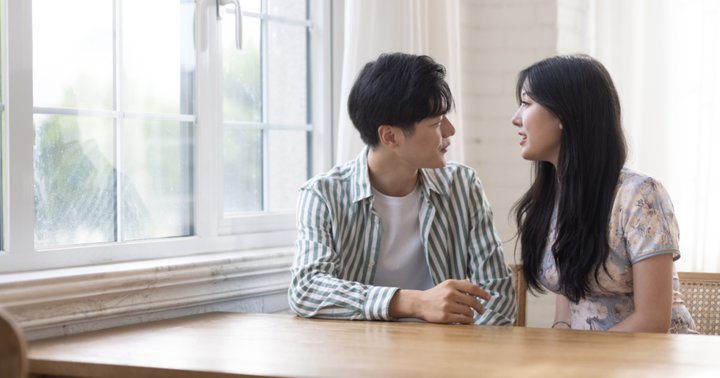‘To Be a Good Buddhist Is Ensnarement’
Jenny Xie’s poetry offers a haunting investigation into the slipperiness of the self. The post ‘To Be a Good Buddhist Is Ensnarement’ appeared first on Tricycle: The Buddhist Review.

Poet Jenny Xie first came across Buddhism by chance: In high school, she bought a Buddhist book at a yard sale on a whim, and it completely “shook [her] foundations” and ruptured and restructured her sense of self. “I can’t understate the freedom that comes—at any age, but especially at that young age—with understanding there is no need to chase after anything, that one innately contains a vast understanding and wisdom,” she said in a 2018 interview. “The freedom and balm of knowing that the root of so much suffering is also an illusion: You are not separate from any other thing.”
This porousness of the self structures much of Xie’s writing, as her poems straddle boundaries of past and future, self and other, and silence and utterance. Probing questions of diasporic identity, her collections traverse worlds both physical and temporal: Eye Level takes the reader across continents in dizzying and dislocating sequences, while The Rupture Tense surfs time to investigate intergenerational memory and grief. Both volumes offer deft and haunting investigations into the nature of subjectivity and what it means to exist between linguistic worlds—as she writes in “Zuihitsu,” “My parents’ and my words do not touch.”
As a Buddhist practitioner, Xie is keenly aware of the limits of language to convey the complexities of in-between states. “Silence is fertile and full,” she told BOMB Magazine, “and language—used conventionally—can feel like a reduction, a narrowing, of what is ample and in flux.” In its very structure her poetry holds space for the silence, honoring and attending to the vastness and multiplicity of experience without arriving at a single answer.
–Sarah Fleming
Zuihitsu
Sunday, awake with this headache. I pull apart the evening with a fork. White
clot behind the eyes.
Someone once told me, before and after is just another false binary. The
warmed-over bones of January. I had no passport. Beneath the stove, two mice
made a paradise out of a button of peanut butter.
Suffering operates by its own logic. Its gropings and reversals. Ample, in ways
that are exquisite. And how it leaves—not unlike how it arrives, without clear
notice.
These days, I’ve had my fill of Chinatown and its wet markets. Gutted fish.
Overcooked chattering. The stench making me look hard at everything.
Summer mornings before the heat has moved in. Joy has been buried in me
overnight, but builds in the early hours. My attention elastic.
The babbling streets of Causeway Bay, out of which the sharp taste of the city
emerges. Nothing can stay dry here. The dark cherries of eyes come and go,
as they please.
Let there be no more braiding of words. I want a spare mouth.
My father taught me wherever you are, always be looking for a way out: this
opening or that one. Or a question. Sharp enough to slice a hole for you to slip
through.
Long car trips where I sat in the back of our family’s used Nissan. The stale
odor of plush seats and sun-warmed cola. My parents’ and my words do not
touch. I grow adept at tunneling inward, a habit I have yet to let go of.
I am protective of what eyes cannot pry open. The unannounced. The infinite
places within language to hide.
A Zen priest once told me that without snagging on a storyline, the body can
only take loss for ninety seconds. The physical body has its limits, is what I
heard. The imagination can break through them.
Boiled peanuts. Leather of daybreak. Cotton thinning out into thread. Dried
vomit. Ice water from the spigot. The sacred and profane share a border. In the
desert, small droppings of unknown origin.
Even when I was young, I loved peering at faces in films. The pleasure of
watching and of not being watched.
Black koi fish open their mouths at the skin of the pond for oxygen. At the edge
of the water, I hold two lines from Ikkyū in my mouth. Make my way slowly.
Nights when I shared a bed in a small room. Another’s body to the left, hooked
by a heavy dream.
Funny, the way we come to understand a place by wanting to escape it.
I can shake out the imprint of my body on the sheets each morning. But the
mind—the mind is a different matter.
When I was four, I ate spoonfuls of powdered milk straight from the canis-
ter. The powder was sweet. There wasn’t enough money for fresh milk. Seven
hundred years ago, Chang Yang-hao wrote, All my life seems / like yesterday
morning.
To Be a Good Buddhist Is Ensnarement
The Zen priest says I am everything I am not.
In order to stop resisting, I must not attempt to stop resisting.
I must believe there is no need to believe in thoughts.
Oblivious to appetites that appear to be exits, and also entrances.
What is there to hoard when the worldly realm has no permanent vacancies?
Ten years I’ve taken to this mind fasting.
My shadow these days is bare.
It drives a stranger, a good fool.
Nothing can surprise.
Clarity is just questioning having eaten its fill.
Long Nights
Ice, entire cakes of it.
Crows feed on sand.
So poor is this season
the ground steals color
from the tree-shadows.
•
Can it be that nothing
is as far as here?
Just look!
How much past we have
to cover this evening—
•
Come to think of it
don’t forget to pick
off this self and that self
along the way.
Though that’s not right—
you spit them out like pits.
•
If there is a partition between
the outer and inner worlds,
how is it that some water in me churns
between the mountain ranges?
How is it we are absorbed so easily
by the ground—
•
Long nights for simple words.
•
Slant rhyme of current thinking
and past thinking.
A chewed over hour, late.
Where the long ago past
and the future come
to settle scores.
•
Traveling and traveling,
but so much interior
unpicked over by the eyes.
•
Nothing is as far as here.
♦
Jenny Xie, “Zuihitsu,” “To Be a Good Buddhist Is Ensnarement,” and “Long Nights” from Eye Level. Copyright © 2018 by Jenny Xie. Reprinted with the permission of The Permissions Company, LLC, on behalf of Graywolf Press, Minneapolis, MN, www.graywolfpress.org.

 Tekef
Tekef 






























